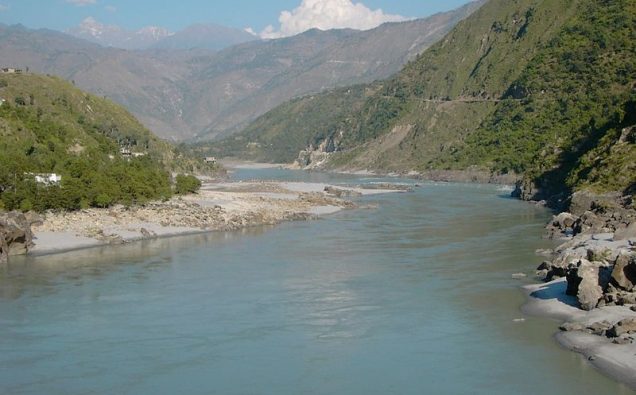
Indus River in Kharmang District, Pakistan Photo Shahnawaz Zafar via Wikimedia Commons
Indian and Pakistani officials will hold talks on water disputes early next week after a lapse of two years, while New Delhi is stepping up work on controversial hydropower projects in Indian-controlled Kashmir
The Indian move is seen as an attempt to deprive Pakistan of its due share of water from rivers flowing .
The work on projects times with a tense stalemate in relations between the two South Asian nuclear-armed neighbors with recent Indian state violence and militancy in Kashmir threatening to be a flashpoint.
Islamabad has hinted at not discussing the controversial projects like Kishanganga and Ratle during the visit of Indian Indus Water Commissioner P.K. Saxena to Islamabad on March 20-21.
“We are not going to discuss these projects at the meeting. Rather, a number of other issues may come under discussion,” says Dr. Asif Baig, Indus Water Commissioner.
Islamabad has always objected to such a projects as power stations being constructed at a cost of US $ 15 billion on rivers flowing into
Pakistan that storage of the natural resource would disrupt water supplies.
As Pakistan’s urban population and economic development grow quickly – without much practical agrarian strategy – its water requirements have also increased manifold.
New Delhi, has recently moved to build the projects that had languished for years but Prime Minister Narendra Modi has been saying that sharing the waterways could be conditional on Pakistan’s relations with India.
Pakistan has opposed some of these projects before, saying they violate the World Bank-mediated Indus Water Treaty that governs sharing of the Indus river and its tributaries. The water inflows are critical to Pakistan as 80% of its irrigated agriculture depends on them.
Indian-Pakistani water tensions have soared even as ultranationalist Prime Minister Modi has accumulated more political influence with a series of victories in large Indian states.
In 2011, the US Senate Committee on Foreign Relations, while confirming Pakistan’s fears, noted that India use the hydropower projects as a way to control Pakistan’s supplies from the Indus – seen as its jugular vein.
“The cumulative effect of these projects could give India the ability to store enough water to limit the supply to Pakistan at crucial moments in the growing season,” the report warned.
Meanwhile, Indian plans include a 1,856 MW Sawalkote plant would not be completed in a few years but in the immediate context New Delhi’s decision could be a serious cause of conflict between neighbors.
In Islamabad Foreign Ministry Spokesman, Nafees Zakaria, said he would confer with the Ministry of Water and Power on the proposed Indian projects, saying it was a technical matter.
“It seems that finally India has realised the importance of this mechanism under the IWT (Indus waters treaty])for resolving water disputes related to the Indus water and its tributaries.”
According to reports in the Indian media, six hydro projects in Indian controlled Kashmir either have cleared viability tests or the more advanced environment and forest expert approvals in the past three months.
These reports say together these projects on the Chenab river, a tributary of the Indus, would triple hydropower generation in Jammu and Kashmir from the current level of 3,000 MW.














